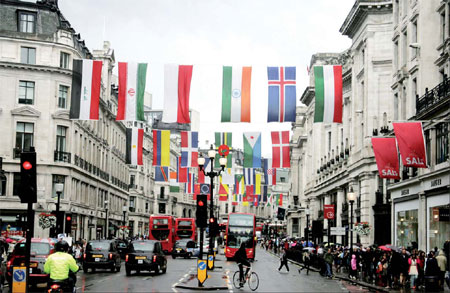
After Olympics, British tourism chiefs begin new campaign
The London Olympics are forecast to have a positive long-term impact on British tourism, despite their failure to attract an immediate surge of visitors to London.
As tourism chiefs analyze the impact of the Games, the British government has stepped up efforts to attract Chinese tourists with an 8 million pound ($12.54 million) marketing campaign for the Chinese market.
"Nobody should underestimate the opportunity China and its cities represent," says Britain's Culture Secretary Jeremy Hunt, who announced the initiative on Aug 14.
|
 National flags celebrating the Olympics Games adorn Regent Street, one of the main shopping streets in London's West End. [Photo/China Daily] |
The funding will be used to give a fillip in the Chinese market to the British government's Great campaign, a four-year global project to promote Britain's image with an initial budget of 100 million pounds.
Hunt said the goal of the extra funding is to increase the annual number of Chinese visitors to Britain from 150,000 now to 500,000 by 2015.
"We'll also be looking at improvements to the visa system and work with airlines and aviation authorities to improve the number of flight connections to China," Hunt said.
China is the only international market to receive extra funding, and Britain's domestic market received 2 million pounds, Hunt announced.
Many tour operators have struggled to capture financial gains during the Olympic period.
The number of bookings with Omega Travel Group, Europe's largest travel agency by number of Chinese customers, dropped around Games time.
The European Tour Operators Association said tourist numbers had fallen "dramatically" in the first few days of the Games.
"We were aware of changing patterns of tourism during the Olympic Games, so we were expecting roughly the same number of Chinese visitors, but in fact tour bookings have dropped, especially for tours outside London," an Omega representative says.
From January to August, Omega says, it has experienced a drop of about 40 percent in Chinese customer numbers compared with last year.
"A large portion of our customers are international students and their parents, therefore we tend to be quite busy during summer holidays, but they may have stayed away this year believing the UK would be crowded during the Olympics."
Omega says it believes another reason tourists have stayed away is because London's transport authority issued warnings about large crowds, urging commuters to vary journeys, take alternative routes or use other means of transport.
This was done as London transport authorities forecast an extra 3 million journeys a day during the Games on top of the usual 12 million, an Olympian test for an underground train network that opened in 1863 during the reign of Queen Victoria.
"We're welcoming more than 1 million people a day," recordings at bus stops and underground stations blared. "There is going to be huge pressure on the transport network."
The message seems to have worked. Commuters and tourists alike were impressed by London's orderly transport network despite a few minor underground signal failures, but retailers suffered as many regular tourists stayed away and Londoners took holidays abroad to avoid the Olympics.
Lastminute.com, an online travel and leisure retailer with its headquarters in London, experienced a 207 percent rise in outbound holiday bookings from July 27 to Aug 12 compared with last year. Popular destinations included Spain, Crete in Greece, Sharm El Sheikh in Egypt and Morocco.


 Washington to remain focused on Asia-Pacific
Washington to remain focused on Asia-Pacific RQFII target blue chips amid bear market
RQFII target blue chips amid bear market Australian recall for top two exporters
Australian recall for top two exporters China fears new car restrictions
China fears new car restrictions